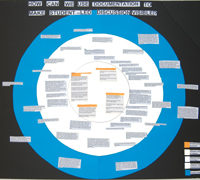Kids give each other credit for insights ? they quote each other as authorities I am struck with how enthusiastic they are to participate. They really come alive when they are asked to be ?in charge? of their learning.
I notice that ideas first expressed in the discussion are often extended of elaborated when listeners reflect in writing.
I notice lots of productive, interesting disagreements. I think that students (especially middle-schoolers) feel more comfortable disagreeing with each other than with teachers.



